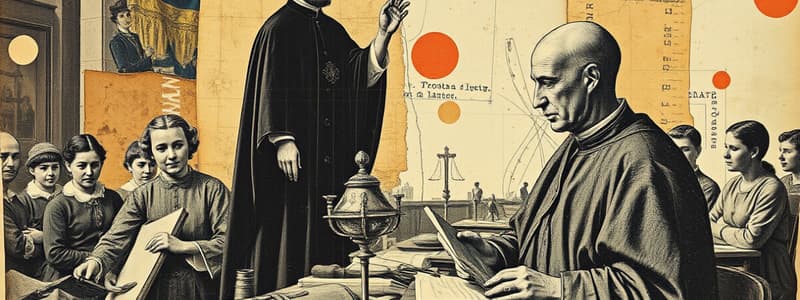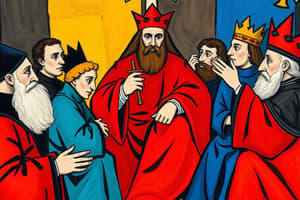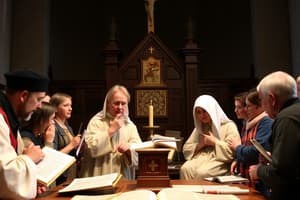Podcast
Questions and Answers
What was one of the primary purposes of the Spanish Inquisition?
What was one of the primary purposes of the Spanish Inquisition?
- To promote Protestantism across Spain.
- To increase trade with neighboring countries.
- To trial and sentence individuals for heresy. (correct)
- To enhance the artistic culture in Spain.
What happened to individuals who confessed to heresy during the Spanish Inquisition?
What happened to individuals who confessed to heresy during the Spanish Inquisition?
- They were immediately executed.
- They were rewarded for their honesty.
- They faced a lesser punishment. (correct)
- They received no punishment.
How did the Spanish Inquisition affect the monarchy's power in Spain?
How did the Spanish Inquisition affect the monarchy's power in Spain?
- It weakened the monarchy's control over the populace.
- It led to the monarchy's demise.
- It had no significant effect on the monarchy.
- It helped increase the monarchy's power and authority. (correct)
What was one of the social consequences of the expulsions of Muslims and Jews during the Spanish Inquisition?
What was one of the social consequences of the expulsions of Muslims and Jews during the Spanish Inquisition?
During the Reformation, how did Catholics and Protestants view each other?
During the Reformation, how did Catholics and Protestants view each other?
What was one of the main educational impacts of the Protestant Reformation?
What was one of the main educational impacts of the Protestant Reformation?
Which concept was affirmed by the Council of Trent regarding the afterlife?
Which concept was affirmed by the Council of Trent regarding the afterlife?
What was a key feature of the Counter Reformation?
What was a key feature of the Counter Reformation?
What role did marriage views play in the effects of the Protestant Reformation?
What role did marriage views play in the effects of the Protestant Reformation?
Which religious order was established for religious renewal during this period?
Which religious order was established for religious renewal during this period?
What was the primary goal of Ignatius of Loyola in founding the Society of Jesus?
What was the primary goal of Ignatius of Loyola in founding the Society of Jesus?
Which belief regarding sacraments was reaffirmed by the Council of Trent?
Which belief regarding sacraments was reaffirmed by the Council of Trent?
How did Queen Mary I earn the nickname 'Bloody Mary'?
How did Queen Mary I earn the nickname 'Bloody Mary'?
What does the Doctrine of Merit state?
What does the Doctrine of Merit state?
What was a common method of execution for heresy during Mary I's reign?
What was a common method of execution for heresy during Mary I's reign?
What was a significant aspect of the Spanish Inquisition?
What was a significant aspect of the Spanish Inquisition?
What social structure was reinforced by Protestant beliefs during the Reformation?
What social structure was reinforced by Protestant beliefs during the Reformation?
Which statement best describes the Jesuits' approach to education?
Which statement best describes the Jesuits' approach to education?
Why was Queen Mary I seen as a controversial figure in history?
Why was Queen Mary I seen as a controversial figure in history?
What did Ignatius of Loyola train his followers to do?
What did Ignatius of Loyola train his followers to do?
What event led to Mary I's claim to the throne?
What event led to Mary I's claim to the throne?
Flashcards are hidden until you start studying
Study Notes
Reformation Overview
- Religion serves as a significant way of life for many.
- Catholicism grew due to historical context and societal influences, particularly during the Renaissance.
Effects of the Protestant Reformation
- Education expanded through public or secondary schools, emphasizing Greek and Latin.
- Shift in marriage views: abolished clerical celibacy; husbands seen as rulers, wives as obedient partners and child-bearers.
Counter-Reformation
- Initiated by the Catholic Church in response to Protestantism, aimed at regaining loyalty and followers.
Council of Trent
- Established to clarify Catholic doctrine and reinforce beliefs.
- Affirmed the Doctrine of Merit, enabling redemption through good works and sacraments.
- Affirmed the existence of Purgatory and the role of prayer and indulgences in reducing purgatorial time.
- Reaffirmed beliefs in transubstantiation and the significance of the seven sacraments.
- Reaffirmed the authority of Scripture and Church traditions.
Early Calls for Reform
- Criticism of Renaissance popes and clergy led to calls for reform.
- Notable figures include St. Teresa of Ávila and the Jesuit order founded by St. Ignatius of Loyola.
Jesuits
- Founded by Ignatius of Loyola, aimed to spread Catholic teachings.
- Emphasized humanistic education and advised nobility.
- Played a key role in globalizing Catholicism, particularly in Asia.
Queen Mary I
- Devout Catholic daughter of Catherine of Aragon, faced challenges after her father’s divorce.
- Restored Catholic faith in England after ascending the throne.
Marian Persecutions
- Nicknamed "Bloody Mary" for executing over 300 dissenters during her reign.
- Execution methods included burning at the stake, tied to her efforts to enforce Catholicism.
Spanish Inquisition
- Established to judge suspected heretics, particularly Protestants.
- Inquisitors offered citizens chances to confess; non-confession led to torture or execution.
Effects of the Spanish Inquisition
- Strengthened monarchical power in Spain while promoting religious uniformity.
- Protestantism was largely eradicated; however, expulsion of Jews and Muslims caused a skilled labor deficit.
Historical Context
- The Reformation was a tumultuous period marked by violent conflicts between Catholics and Protestants, each side convinced of its righteousness.
Studying That Suits You
Use AI to generate personalized quizzes and flashcards to suit your learning preferences.




